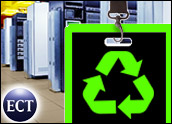
Carbon accounting outsourcing (CAO) could be the next big thing in the US$80 billion business process outsourcing (BPO) industry.
Early out of the gate is FirstCarbon, a carbon data management subsidiary of global outsourcing services provider ADEC Solutions. Launched in June 2009, FirstCarbon is touted as the first outsourcing firm to allow companies to hand over their carbon measurement and reporting activities to a third party.
While numerous green consultancies offer firms advice on how to comply with carbon reporting requirements, none have been able to undertake the complex and time-consuming work necessary to collect and report on energy use and carbon emissions, Ian McGowan, the company’s director, told BusinessGreen.com in June. [*Correction – Jan. 5, 2010]
“We don’t pretend to have huge expertise in carbon offsets and strategy and so on,” McGowan said. “But we are able to look at the granular level and pull together the information firms need to work out their carbon footprint and report on it.”
FirstCarbon also expects to offer customers a more cost-effective means of reporting on emissions by emulating ADEC’s offshore outsourcing model.
“ADEC’s experience in BPO means we already understand how to handle much of the data that will be required, such as accounts payable information and fuel costs,” explained McGowan. “And by using our facilities in the Philippines we would expect to offer cost savings of 35 to 40 percent compared with doing the work in-house.”
In-House Accounting Challenges
Counting carbon — specifically, measuring and reporting the emission levels of its dioxide form (CO2) — is big news. Carbon emissions made headlines worldwide in December, when delegates from 193 countries gathered in Copenhagen, Denmark, at the U.N. climate summit to discuss how to fund global greenhouse gas (GHG) emission cuts.
Doing the carbon accounting work in-house could be a major obstacle for companies worldwide as they scramble to deal with the rising regulatory and market forces currently driving major organizations to establish public goals for reducing energy and resource use — and all the carbon emissions that result from such activity.
U.S. companies are gearing up for operating in an economy characterized as “carbon constrained” — that is, one in which the government limits yearly carbon emissions and requires big emitters to accurately report them.
Mandatory reporting of greenhouse gases (GHG) in the U.S. is now required for some companies nationwide. The U.S. Environmental Project Agency (EPA) Final Mandatory Reporting of Greenhouse Gases Rule requires reporting from most large U.S. GHG emissions sources. The stated purpose of the rule is to collect accurate and timely emissions data to inform future policy decisions. Initial reports, covering emissions during 2010, are due on March 31, 2011.
Energy management outsourcing is a way of addressing the current energy challenges facing all organizations, namely high and volatile energy prices, the need to mitigate climate change and potential supply constraints as oil production peaks. These problems are likely to intensify in the coming years, yet most organizations have reduced in-house capability to address them, so outsourcing is increasingly seen as an essential part of any strategy to reduce energy use and carbon emissions. Carbon impacts are a growing consideration for managers deciding whether and how much to outsource.
One specialist servicing this market is Chisk, with offices in the U.S., UK, Germany, Japan and India. Chisk provides BPO support services to law firms specializing in environmental and energy law. The company utilizes trained offshore professionals, primarily in India, to provide its global client list of law firms with such services as legal research, analysis and reporting, document management, fact finding, data entry and information mining.
“The coming mandate for carbon management, while placing unwanted burdens on many enterprises, will certainly be keeping law practices busy helping their clients comply with carbon reduction legislation,” said Shekhar Chitnis, Chisk’s president and CEO. “Since tracking carbon credits is a non-core activity for most corporations, doing the work themselves offers very little direct economic advantage, which makes it an ideal activity for outsourcing to dedicated specialist third parties.”
A successful implementation, according to Chitnis, boils down to effectively addressing three factors: accuracy, speed and cost.
“While the clients of our clients — the law firms for which we provide services — cannot avoid this burden, we can certainly help lighten their loads by addressing these three factors,” Chitnis told the E-Commerce Times.
“Doing this correctly means combining the benefits of the latest software, customized processes, dedicated and trained staff and offshore labor efficiencies to ensure accurate, speedy and cost-effective responses to all the new carbon data management and reporting requirements.”
Enterprise Carbon Accounting Software
Many companies begin the carbon accounting process internally by manually gathering baseline information, then using spreadsheets to calculate and track initial results.
“If a firm needs to outsource this process, they hire a consultant who brings expertise and has a preferred tool,” said Groom Energy Solution‘s VP of Consulting Paul Baier, who told the E-Commerce Times that “99 percent” of such consultants use Microsoft Excel spreadsheets.
However, according to Baier, a growing number of companies are also turning to new sustainability enterprise carbon accounting (ECA) software offerings, primarily Web-based tools intended to help businesses manage, analyze and report on their carbon footprints.
About 95 percent of the 300 known ECA deployments are hosted solutions as opposed to conventional “on-premise” installations that require end-user run servers, database software, and IT support, Baier estimated. This hosted model is prevalent, he said, because most of the ECA vendors have a Software as a Service (SaaS)-delivery model, which takes out the big upfront costs of running the system in-house.
This development is giving rise to a global market for carbon accounting, collecting data and consulting services that is expected to reach $7 billion to $9 billion in by 2012, according to a Groom Energy June 2009 report.
Knowing Your GHG Physics and Chemistry
Larry Goldenhersh is CEO of Carlsbad, Calif.-based Enviance, which sells ECA software delivered via the Internet using the SaaS model. Enviance’s EHS Compliance, GHG and carbon accounting, and sustainability SaaS platform is designed to help companies track and monitor all the CO2 and other GHGs they emit. Enviance’s clients include industrial giants like Chevron, DuPont and U.S.’s biggest source of GHG emissions, American Electric Power (AEP).
Within customer companies, Enviance software is generally implemented by in-house staff environmental engineers, according to Goldenhersh.
However, for companies lacking the in-house resources to fully implement the software, Enviance partners with expert consulting and engineering (C&E) firms trained in meeting EHS compliance, GHG and carbon accounting, and sustainability requirements. These firms range from Clover Leaf Environmental Solutions, a specialty industrial hygiene and environmental management firm based in Albuquerque, N.M., to Denver, Col.-based CH2M HILL, a global provider of engineering and operations consulting services with $5.8 billion in revenues and more than 25,000 employees.
BPO service providers have a strong potential future in implementing sustainability accounting software initiatives and GHG management, said Goldenhersh, provided that outsourcers fully understand the business processes involved in achieving compliance with air, water and waste permits, and know how to use centralized software systems like the Enviance platform grounded in the physics and chemistry of GHGs.
Given strict adherence to those constraints, “I believe carbon accounting will drive multi-billion dollar opportunities for all companies in this space,” Goldenhersh told the E-Commerce Times.
One company for which CAO doesn’t necessarily resonate, however, is Hara, a Redwood City, Calif.-based ECA software vendor.
“Hara customers are implementing a truly repeatable and auditable business process, so we don’t see much focus on ‘outsourcing,'” Hara CMO Chris Farinacci told the E-Commerce Times.
Still, Hara is building relationships with a network of strategic environmental and business consulting partners to provide Hara customers with end-to-end software, services and technologies delivered along the resource value chain, according to Farinacci.
SAP Buys In
For software giant SAP, CAO is definitely a compelling model. In May 2009, SAP bought Sterling, Va.-based Clear Standards to speed up its ability to meet the carbon management requirements of customer organizations. SAP made the purchase at a time of stringent government regulations and public expectations for better transparency.
Renamed “SAP Carbon Impact,” the application helps companies measure, optimize and report GHG emissions and other environmental impacts across internal operations and the supply chain so that they can prepare for regulatory changes, reduce costs and reinforce positive brand images. SAP Carbon Impact is an on-demand solution delivered via a secure, scalable, Web-based platform with a purpose-built user interface.
Outsourcing use of the software is a key part of SAP’s strategy, according to Richard Mendis, SAP Carbon Impact’s vice president for solution management. SAP works with both global system integrator partners such as PWC, Accenture and CSC, and environmental specialist firms such as WSP, ERM and ClearCarbon. Personnel at these companies are trained on SAP Carbon Impact and can implement and/or manage the solution for SAP customers, according to Mendis.
“Our partners are global in scope,” Mendis told the E-Commerce Times. “We have systems integrator partners in India/APAC, Europe, North America and other regions. It is worth noting that this global scale is a unique advantage of SAP versus carbon management startups.”
*ECT News Network editor’s note – Jan. 5, 2010: Statements in this article from Ian McGowan originally appeared in a BusinessGreen.com from June of 2009. Our original publication of this article omitted the attribution.























































Ned, first of all, thank you for mentioning FirstCarbon so prominently in this article.
Just wanted to make one correction, though.
The quote from Ian McGowan…is no longer accurate. In addition to our carbon-accounting outsourcing capabilities, which really do set us apart in the industry, FirstCarbon now offers complete, end-to-end carbon management.
As part of our North America expansion, we hired some of the foremost sustainability experts in the United States. We also acquired Enverity Corporation and its ghgTrack carbon-management software application.
In short, we provide carbon experts to help companies determine what to do, the technology to do it and carbon-accounting outsourcing to do it faster, better and cheaper. So companies can focus on running their core businesses and leave the sustainability details to us.